Scene I
A Garret
In an unheated garret Marcello, an artist, is working on his canvas “Crossing the Red Sea”. He has difficulty holding his brush because the cold has so cramped his fingers. His friend, the poet Rodolfo, enviously looks at the smoke emerging from the smokestacks of the well-heated Parisian houses. Marcello sadly muses over his flighty and unfaithful girl-friend Musetta. Rodolfo turns down Marcello’s offer to fire the stove with his unfinished “Red Sea” and decides to sacrifice the first act of his drama rather than break up the chair for this purpose.
Another friend, the philosopher Colline, returns with a bundle of books that he wanted to sell, but since this is Christmas eve the stores were closed. His bad mood is dispelled by the warmth of the heated stove.
The fourth member of the group of friends arrives. The musician Schaunard with the help of errand-boys has brought delicious snacks, wine, cigars, firewood and a bunch of coins. All are so aghast atthe sight of such riches that they are not listening to Schaunard’s story about what happened. He became acquainted with a bored Englishman who wanted nothing more of him than that he “play” until death a parrot that was disturbing him. The successful job, which was not completed without a little poison, was generously rewarded. Schaunard hinders the immediate consumption of the food, but allows them to enjoy the wine. Then, in a condescending tone, he invites his friends to partake in Latin Quarter cuisine.
The joyful mood is disturbed by the arrival of Benoit, the old landlord, who demands the long-overdue rent. They reassure him by showing that they have money and offer him wine. He becomes somewhat tight and boasts of past amorous escapades, whereupon they hit him with his own weapon of Philistine morals: indignantly, they turn the shameful “debauchee” out of the room without paying the rent. Schaunard magnanimously shares his money with his friends and all head for their favourite cafe. Rodolfo decides to stay for a few minutes to finish an article. The friends will wait for him below.
Mimi, a neighbour, comes to ask that her extinguished candle be lighted. A coughing spell detains her in the room. Rodolfo is captivated by the tender creature. After leaving, Mimi returns in search of her key. The draft extinguishes both candles. Rodolfo and Mimi rummage in the dark in search of the key. Rodolfo finds it and unnoticed hides it. Taking advantage of the situation, he dares totouch Mimi’s hand.
Rodolfo contemplates: can he build castles in the air when he is merely a hopelessly poor poet? But Mimi’s beautiful eyes immediately give him reason for optimism.
Mimi tells about herself: she is a seamstress. Her simple existence is warmed by the modest happiness of “unrealizable fantasies” and the “poetry” of minutiae. Rodolfo’s friends are still waiting below and call to him. He tells them to go on and promises to follow shortly. In the enchanting beams of the moonlight penetrating the attic, Rodolfo and Mimi speak of their love for each other.Then, Mimi remembers their promise, so hand in hand they head for the Latin Quarter.
Scene II
In the Latin Quarter
At the Christmas fair in front of the cafe, traders offer their goods. Each of the friends, having come into means, makes his purchases. Schaunard buys a defective horn, Colline acquires a stack of books and Rodolfo a mob-cap for Mimi. Only Marcello, yearning for Musetta, cannot find consolation in spending money or flirting with other girls. The companions finally meet in the cafe. Mimi is gladly accepted as one of the group. While in the street children noisily surround Parpignol, the trader of toys. They order exquisite viands. Rodolfo and Mimi’s love makes Marcello utter bitter truths.
The season for Marcello’s dejected state soon comes to light. The appearance of Musetta, accompanied by a rich and already piqued suitor, calls forth a burst of animation in the cafe. The darling ofthe Latin Quarter tries by all means to attract the attention of her former lover. Marcello, despite all efforts, cannot hide that he is not indifferent to her. When Musetta, to Alcindoro’s shame, sings a song directed only to Marcello, the ice breaks. Enfeebled Alcindoro is unable to pacify excited Musetta. Musetta gets rid of her suitor by claiming that her foot hurts and she needs new shoes. As soon as he leaves, Musetta and Marcello fall into each others arms. The check brought by the waiter causes bewilderment, but Musetta puts the bill on Alcindoro’s account. When Alcindoro returns, he finds the cafe empty. He remains alone with the box of shoes and the unpaid bill.
Scene III
At the Gate d’Enfer
Marcello and Musetta have found temporary quarters in a tavern on the outskirts of Paris. Marcello is painting a signboard for the owner. Mimi, plagued by coughing spells, asks the sergeant about theartist Marcello. She calls him from the tavern and tells him about her troubles. She knows that Rodolfo loves her, but nevertheless he has left her.
Marcello confirms that Rodolfo has come here early morning and, exhausted, is now sleeping. Under such circumstances, he is also for separation. He, like Musetta, prefers a light relationship.Rodolfo wants to open his heart to his friend. Marcello does not hide that he thinks Marcello is concealing something. Rodolfo claims that Mimi continuously flirts with other men, so that living with her has become impossible. When Marcello expresses doubts, Rodolfo reveals the real reason for his decision: Mimi’s incurable disease and his poor room with northern exposure is undermining her health further. Marcello is unable to prevent Mimi from learning the bitter truth. A coughing spell reveals her presence. Repenting, Rodolfo embraces Mimi, while jealous Marcello, infuriated by the flirtatious laughter of Musetta, rushes into the tavern.
Now, Mimi has decided to leave Rodolfo. But recalling their life together does not allow them to separate. While Marcello makes a scene out of jealousy and Musetta leaves him again, Rodolfo and Mimidecide to postpone separation until Spring.
Scene IV
A Garret
Several months later. Rodolfo and Marcello are again alone in the garret. They cannot forget their past happiness. The friends are submerged in thoughts. Each is looking at his pledge of love: Marcello at Musetta’s portrait and Rodolfo at the mob-cap, his present to Mimi.
Schaunard and Colline enter and bring only stale bread and a wretched herring. With the humour of gallows-birds, they act as though before them is a richly-laden table.
At the height of the merriment, Musetta rushes in with the news that Mimi feels her end is approaching. Rodolfo seats Mimi in an arm-chair. Life returns. Everyone tries to lighten Mimi’s suffering. Marcello is to sell Musetta’s earrings and bring medicine. Musetta wants to buy a muff for Mimi’s hands that are always cold.
Colline is taking his old, worn coat to be pawned. Schaunard, who has nothing, contributes his only available contribution: he leaves Mimi and Rodolfo alone.
Happiness returns to Rodolfo and Mimi. They talk about memories of their past. A sudden choking spell makes Mimi silent. Marcello returns with medicine, Musetta with the desired muff. She supports Mimi’s illusion that it is Rodolfo’s gift. Mimi falls asleep happy. Marcello reports that the doctor will come soon. Schaunard is the first to realize that Mimi is dead. Colline returns with money from the pawnshop. The change in the behaviour of Marcello and Schaunard makes Rodolfo realize that Mimi has died.
Place: Paris
Time: Around 1830.
Act 1
In the four bohemians' garret (Christmas Eve)
Marcello is painting while Rodolfo gazes out of the window. They complain of the cold. In order to keep warm, they burn the manuscript of Rodolfo's drama. Colline, the philosopher, enters shivering and disgruntled at not having been able to pawn some books. Schaunard, the musician of the group, arrives with food, wine and cigars. He explains the source of his riches: a job with an eccentric English gentleman, who ordered him to play his violin to a parrot until it died. The others hardly listen to his tale as they set up the table to eat and drink. Schaunard interrupts, telling them that they must save the food for the days ahead: tonight they will all celebrate his good fortune by dining at Cafe Momus, and he will pay.
The friends are interrupted by Benoît, the landlord, who arrives to collect the rent. They flatter him and ply him with wine. In his drunkenness, he begins to boast of his amorous adventures, but when he also reveals that he is married, they thrust him from the room—without the rent payment—in comic moral indignation. The rent money is divided for their evening out in the Quartier Latin.
Marcello, Schaunard and Colline go out, but Rodolfo remains alone for a moment in order to finish an article he is writing, promising to join his friends soon. There is a knock at the door. It is a girl who lives in another room in the building. Her candle has blown out, and she has no matches; she asks Rodolfo to light it. She is briefly overcome with faintness, and Rodolfo helps her to a chair and offers her a glass of wine. She thanks him. After a few minutes, she says that she is better and must go. But as she turns to leave, she realizes that she has lost her key.
Her candle goes out in the draught and Rodolfo's candle goes out too; the pair stumble in the dark. Rodolfo, eager to spend time with the girl, to whom he is already attracted, finds the key and pockets it, feigning innocence. He takes her cold hand (Che gelida manina—"What a cold little hand") and tells her of his life as a poet, then asks her to tell him more about her life. The girl says her name is Mimì (Sì, mi chiamano Mimì—"Yes, they call me Mimì"), and describes her simple life as an embroiderer. Impatiently, the waiting friends call Rodolfo. He answers and turns to see Mimì bathed in moonlight (duet, Rodolfo and Mimì: O soave fanciulla—"Oh lovely girl"). They realize that they have fallen in love. Rodolfo suggests remaining at home with Mimì, but she decides to accompany him to the Cafe Momus. As they leave, they sing of their newfound love.
Act 2
Quartier Latin (same evening)
A great crowd, including children, has gathered with street sellers announcing their wares (chorus: Aranci, datteri! Caldi i marroni!—"Oranges, dates! Hot chestnuts!"). The friends arrive; Rodolfo buys Mimì a bonnet from a vendor, while Colline buys a coat and Schaunard a horn. Parisians gossip with friends and bargain with the vendors; the children of the streets clamor to see the wares of Parpignol, the toy seller. The friends enter the Cafe Momus.
As the men and Mimì dine at the cafe, Musetta, formerly Marcello's sweetheart, arrives with her rich (and elderly) government minister admirer, Alcindoro, whom she is tormenting. It is clear she has tired of him. To the delight of the Parisians and the embarrassment of her patron, she sings a risqué song (Musetta's waltz: Quando m'en vo'—"When I go along"), hoping to reclaim Marcello's attention. The ploy works; at the same time, Mimì recognizes that Musetta truly loves Marcello. To be rid of Alcindoro for a bit, Musetta pretends to be suffering from a tight shoe and sends him to the shoemaker to get her shoe mended. Alcindoro leaves, and Musetta and Marcello fall rapturously into each other's arms.
The friends are presented with their bill. However, Schaunard's purse has gone missing and no one else has enough money to pay. The sly Musetta has the entire bill charged to Alcindoro. The sound of a military band is heard, and the friends leave. Alcindoro returns with the repaired shoe seeking Musetta. The waiter hands him the bill and, dumbfounded, Alcindoro sinks into a chair.
Act 3
At the toll gate at the Barrière d'Enfer (late February)
Peddlers pass through the barriers and enter the city. Mimì appears, coughing violently. She tries to find Marcello, who is currently living in a little tavern where he paints signs for the innkeeper. She tells him of her hard life with Rodolfo, who abandoned her the night before, and of Rodolfo's terrible jealousy (O buon Marcello, aiuto!—"Oh, good Marcello, help me!"). Marcello tells her that Rodolfo is asleep inside, and expresses concern about Mimì's cough. Rodolfo wakes up and comes out looking for Marcello. Mimì hides and overhears Rodolfo first telling Marcello that he left Mimì because of her coquettishness, but finally confessing that his jealousy is a sham: he fears she is slowly being consumed by a deadly illness (most likely tuberculosis, known by the catchall name "consumption" in the nineteenth century). Rodolfo, in his poverty, can do little to help Mimì and hopes that his pretended unkindness will inspire her to seek another, wealthier suitor (Marcello, finalmente—"Marcello, finally").
Out of kindness towards Mimì, Marcello tries to silence him, but she has already heard all. Her weeping and coughing reveal her presence, and Rodolfo hurries to her. Musetta's laughter is heard and Marcello goes to find out what has happened. Mimì tells Rodolfo that she is leaving him, and asks that they separate amicably (Mimì: Donde lieta uscì—"From here she happily left"); but their love for one another is too strong for the pair to part. As a compromise, they agree to remain together until the spring, when the world is coming to life again and no one feels truly alone. Meanwhile, Marcello has found Musetta, and the couple quarrel fiercely about Musetta's flirtatiousness: an antithetical counterpoint to the other pair's reconciliation (quartet: Mimì, Rodolfo, Musetta, Marcello: Addio dolce svegliare alla mattina!—"Goodbye, sweet awakening in the morning!").
Act 4
Back in the garret (some months later)
Marcello and Rodolfo are trying to work, though they are primarily talking about their girlfriends, who have left them and found wealthy lovers. Rodolfo has seen Musetta in a fine carriage and Marcello has seen Mimì dressed like a queen. The men both express their nostalgia (duet: O Mimì, tu più non torni—"O Mimì, will you not return?"). Schaunard and Colline arrive with a very frugal dinner and all parody eating a plentiful banquet, dance together and sing, before Schaunard and Colline engage in a mock duel.
Musetta suddenly appears; Mimì, who took up with a wealthy viscount after leaving Rodolfo in the spring, has left her patron. Musetta found her that day in the street, severely weakened by her illness, and Mimì begged Musetta to bring her to Rodolfo. Mimì, haggard and pale, is assisted onto a bed. Briefly, she feels as though she is recovering. Musetta and Marcello leave to sell Musetta's earrings in order to buy medicine, and Colline leaves to pawn his overcoat (Vecchia zimarra—"Old coat"). Schaunard leaves with Colline to give Mimì and Rodolfo some time together. Mimì tells Rodolfo that her love for him is her whole life (aria/duet, Mimì and Rodolfo: Sono andati?—"Have they gone?").
To Mimì's delight, Rodolfo presents her with the pink bonnet he bought her, which he has kept as a souvenir of their love. They remember past happiness and their first meeting—the candles, the lost key. Suddenly, Mimì is overwhelmed by a coughing fit. The others return, with a gift of a muff to warm Mimì's hands and some medicine. Mimì gently thanks Rodolfo for the muff, which she believes is a present from him, reassures him that she is better and falls asleep. Musetta prays. Schaunard discovers that Mimì has died. Rodolfo rushes to the bed, calling Mimì's name in anguish, weeping helplessly as the curtain falls.


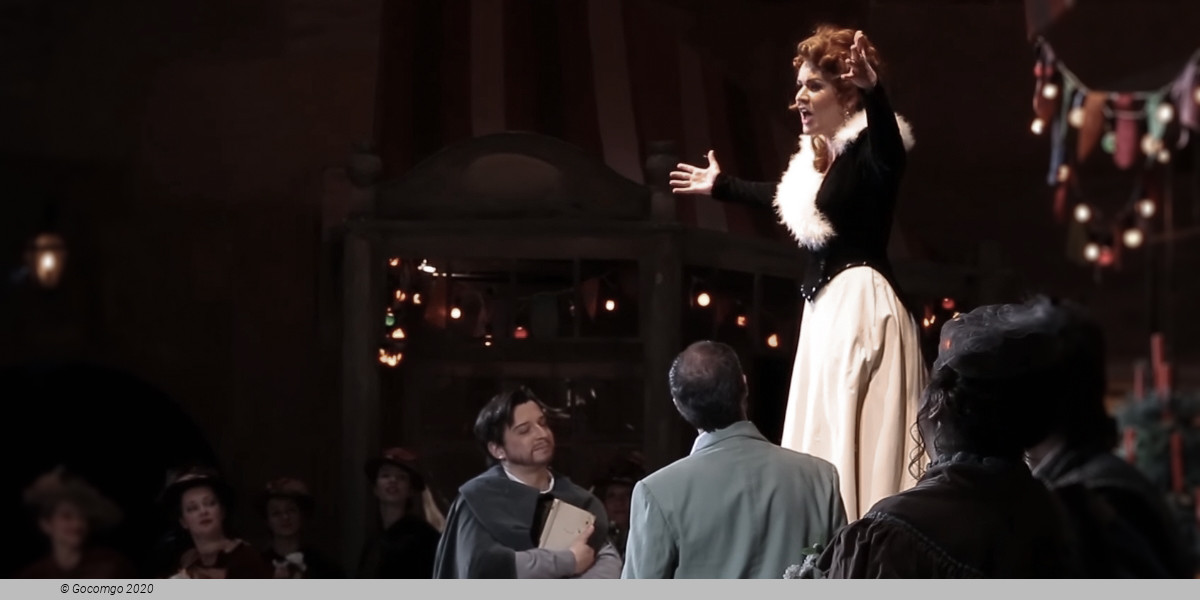
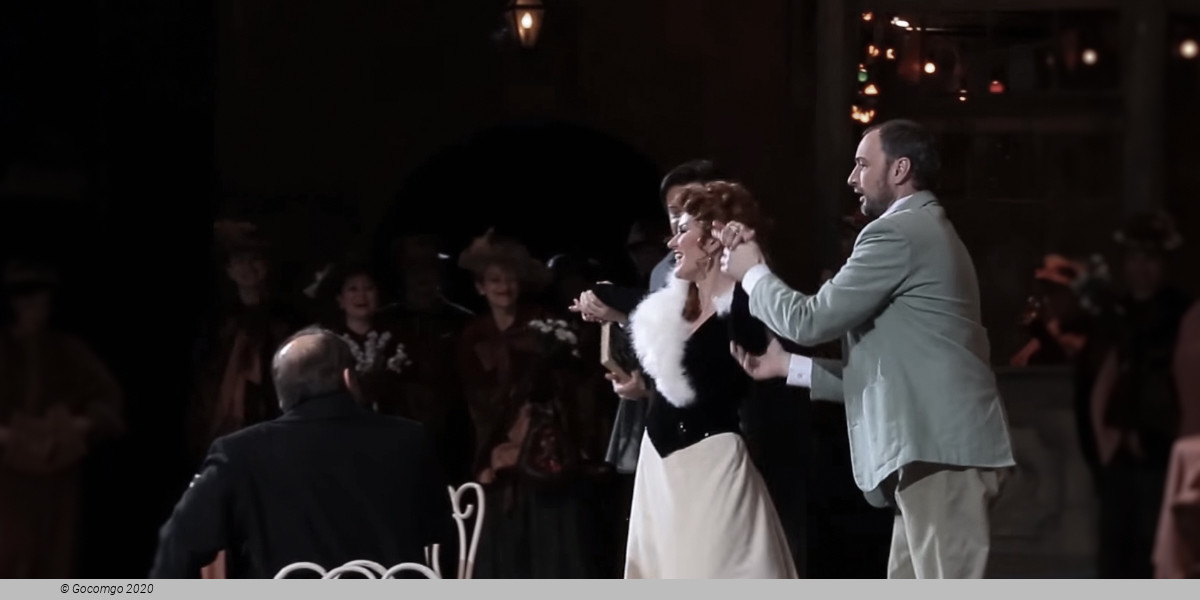
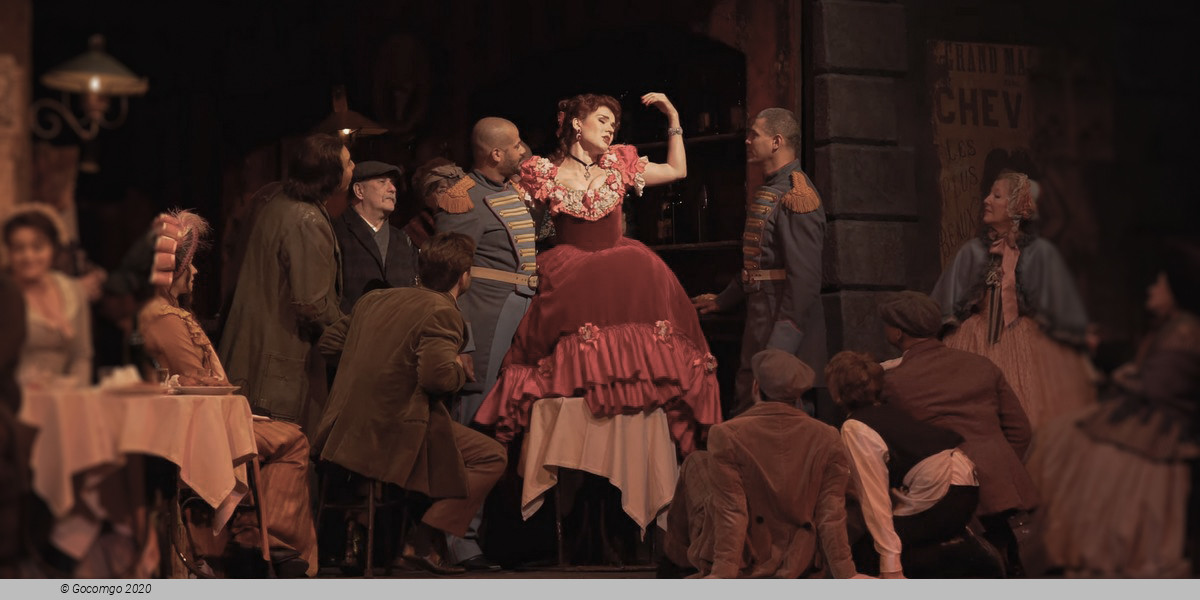
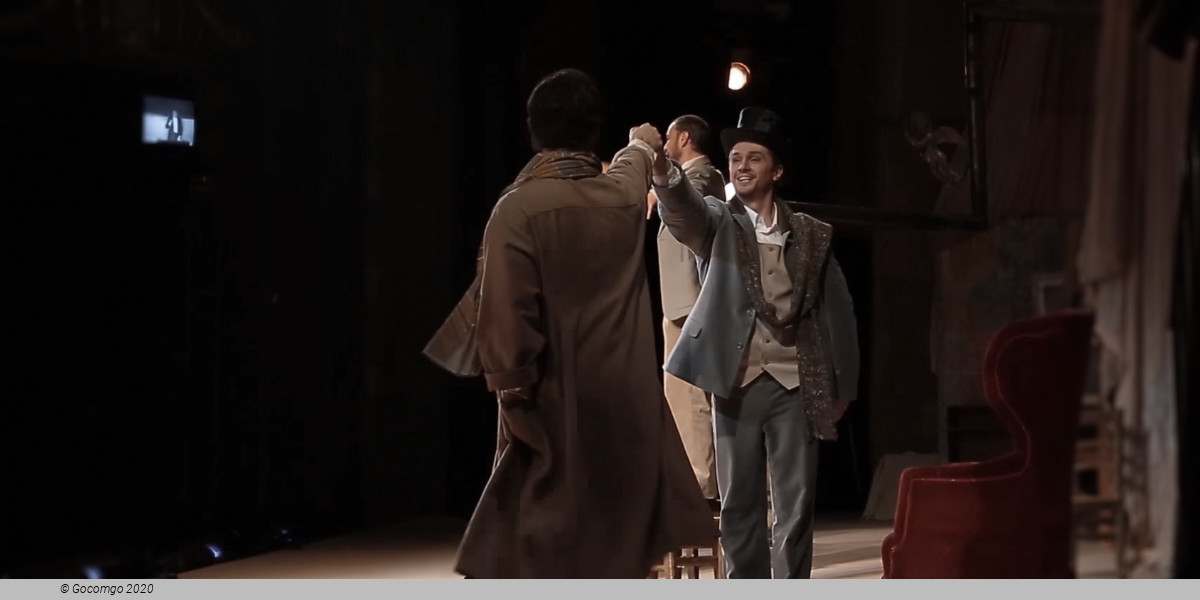
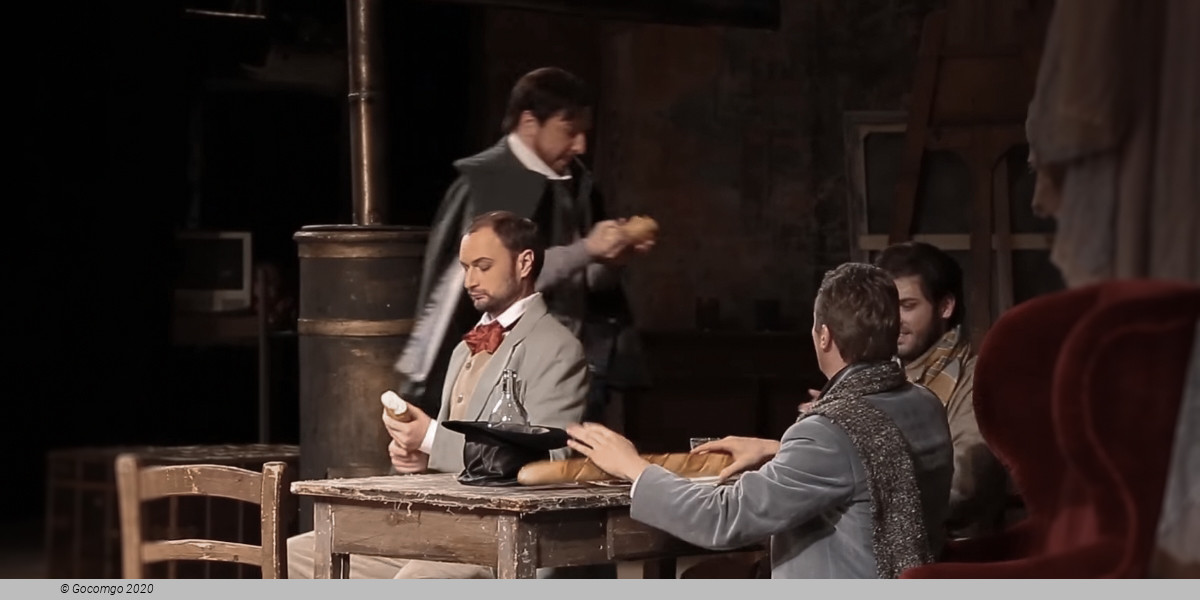
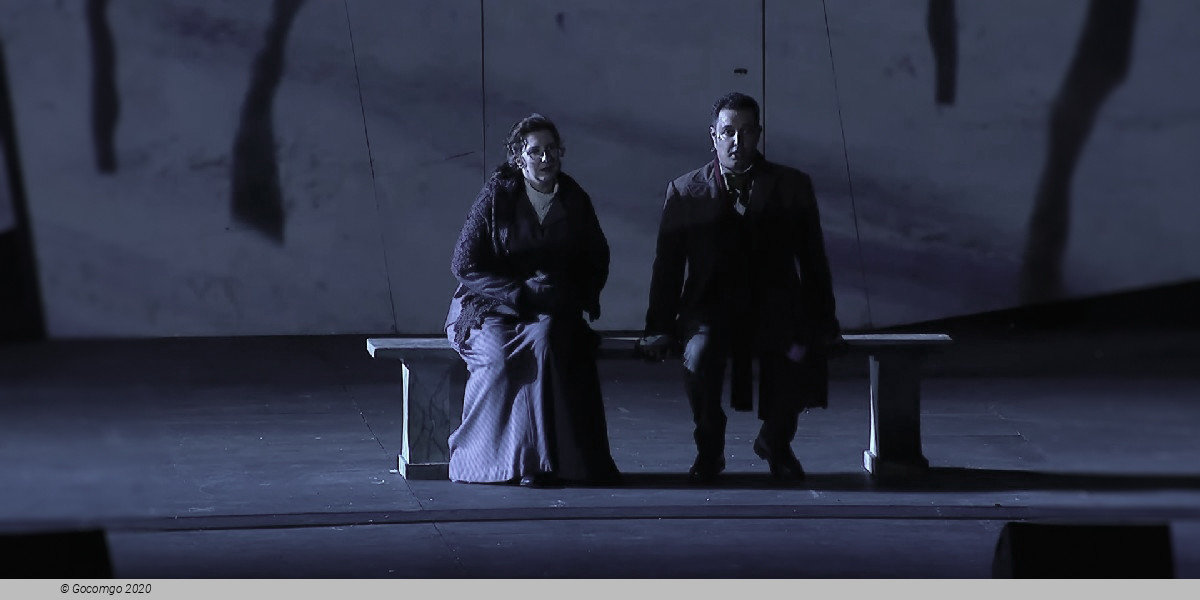
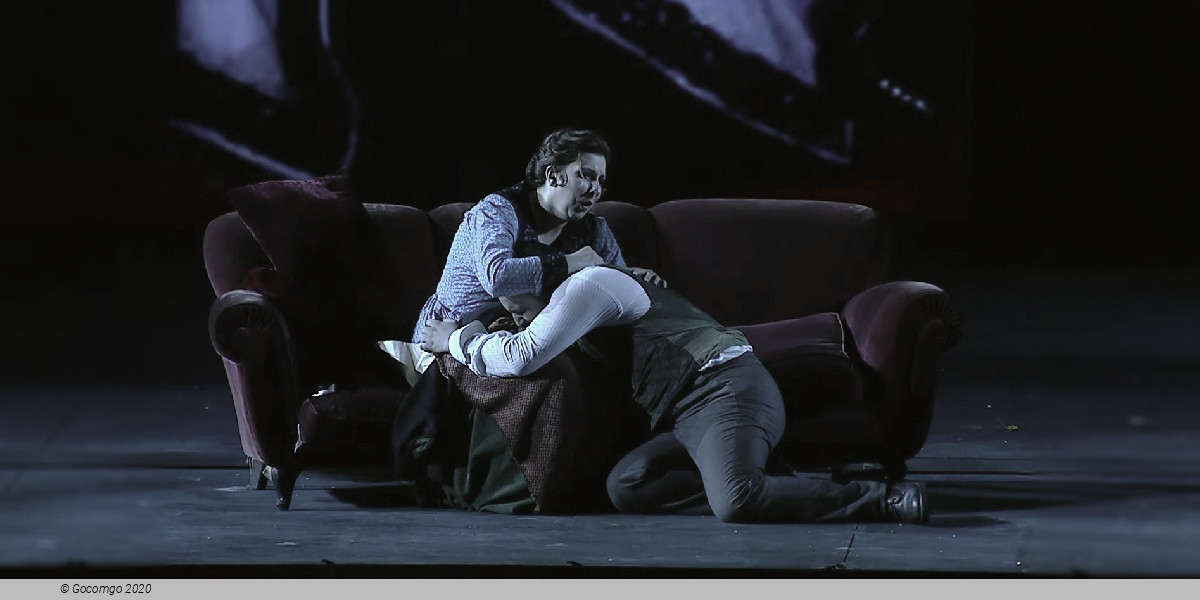
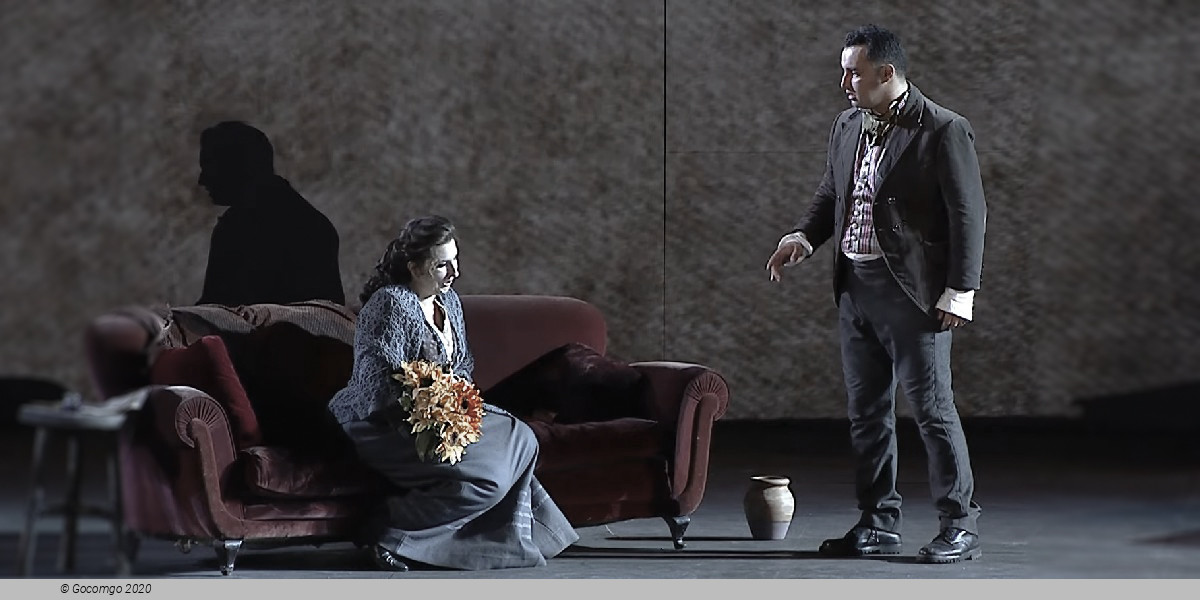
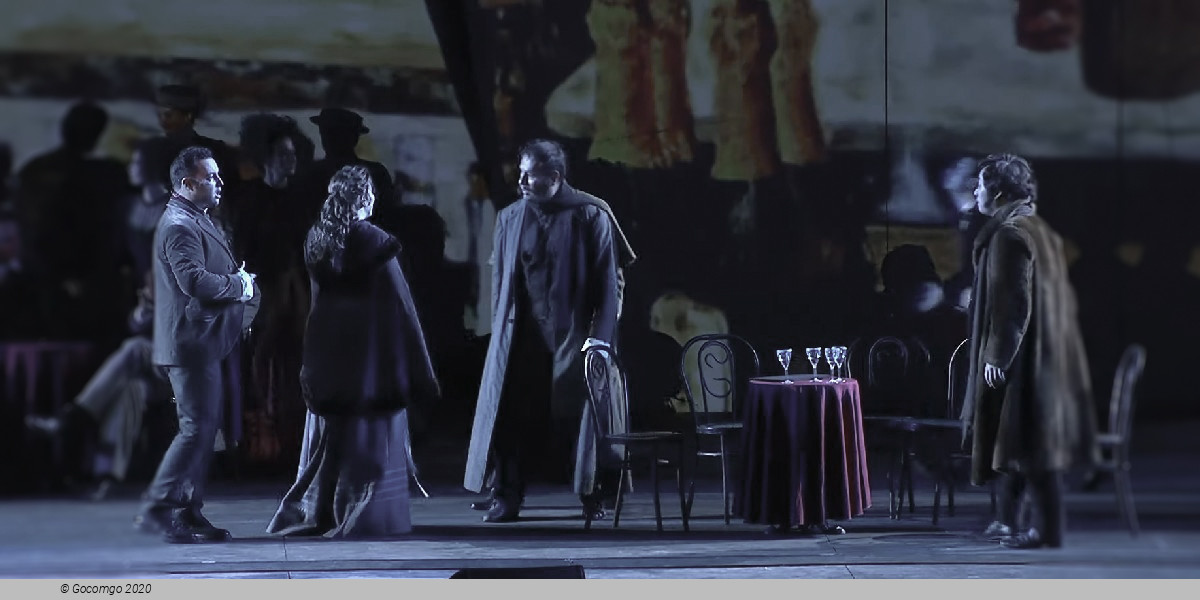
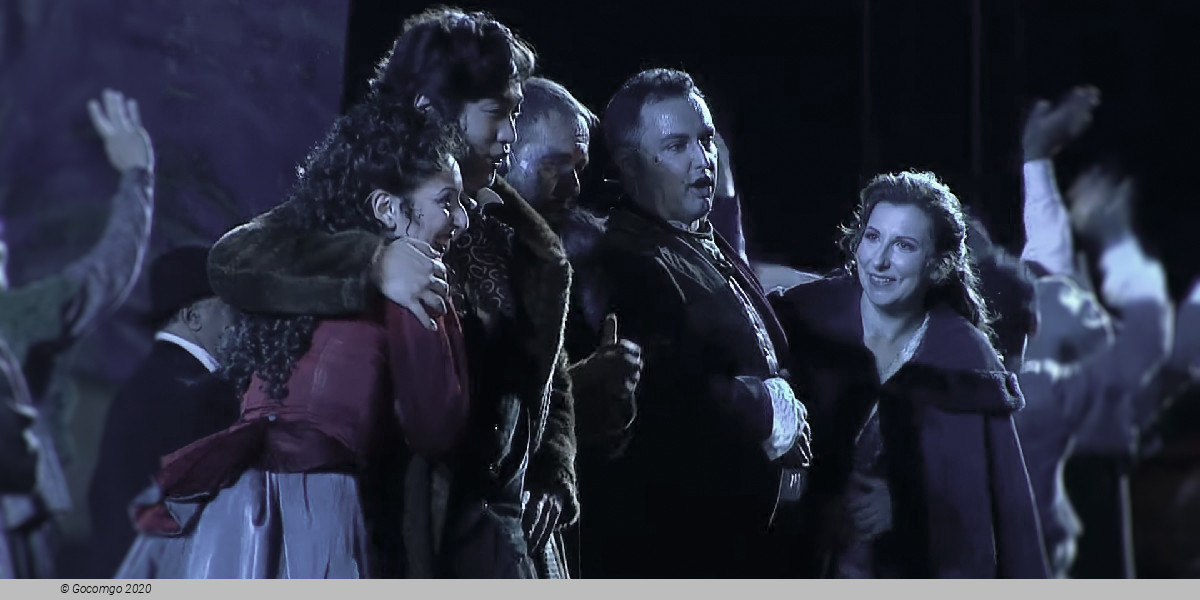
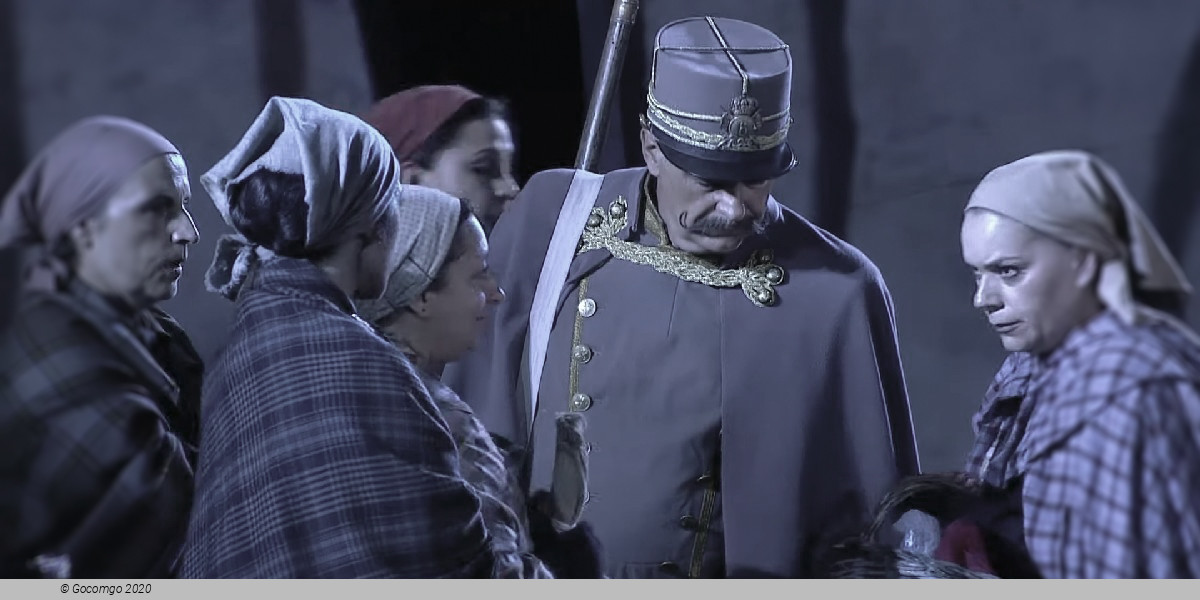
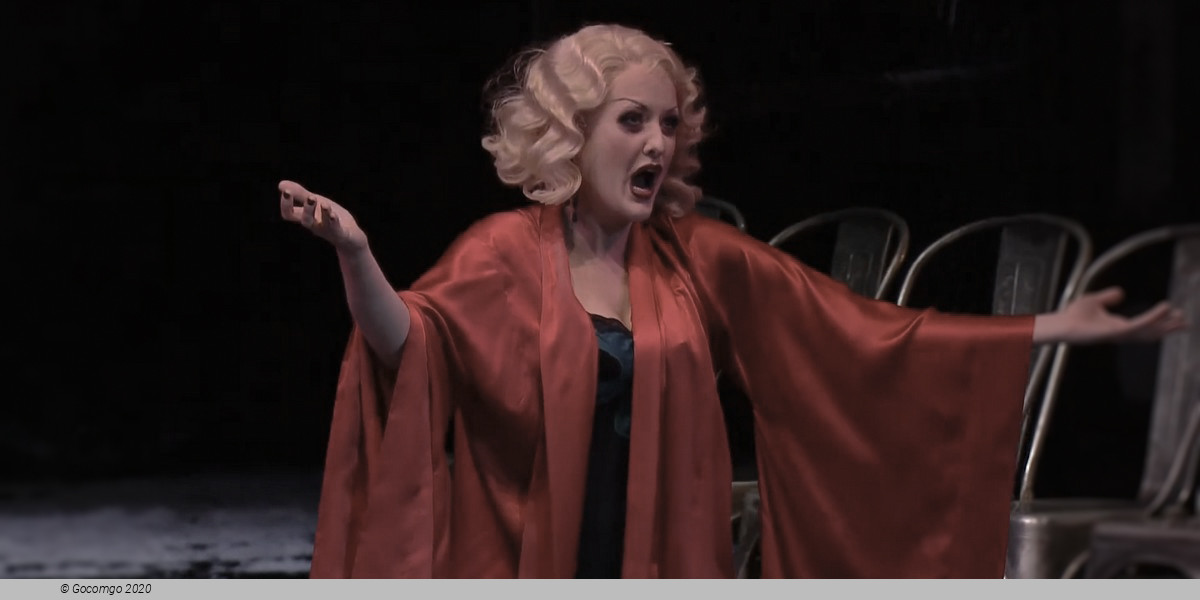
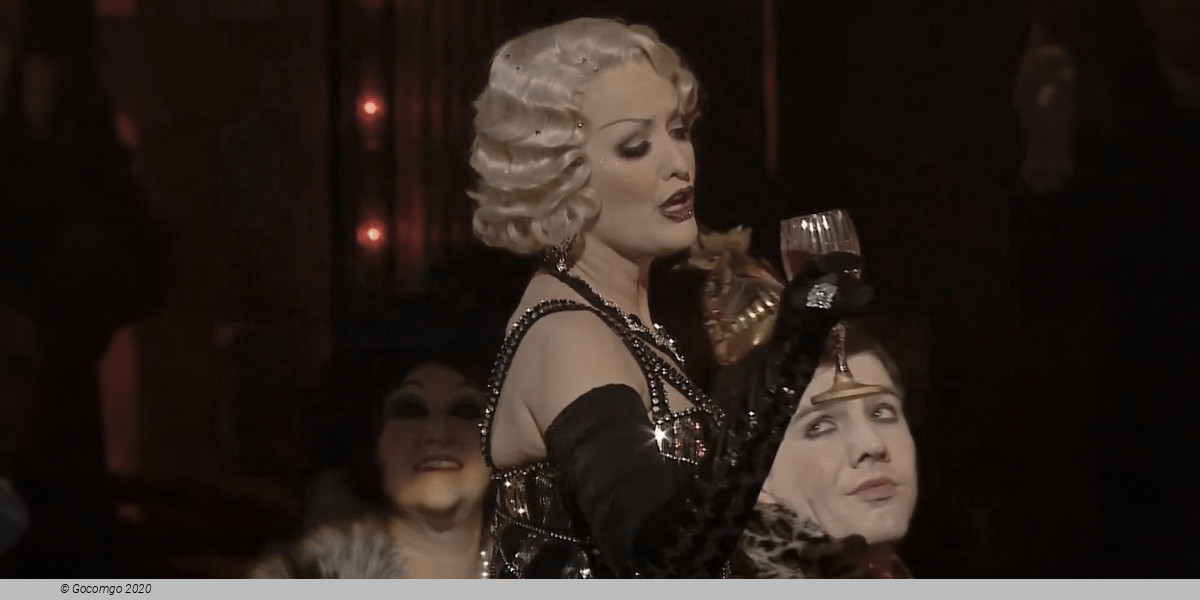
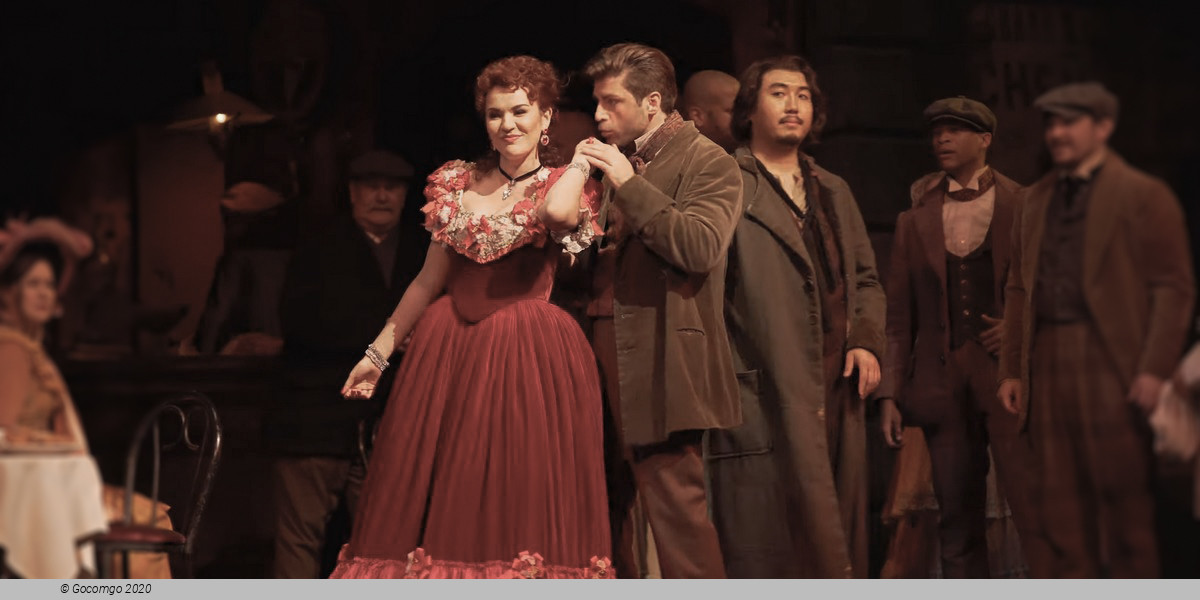
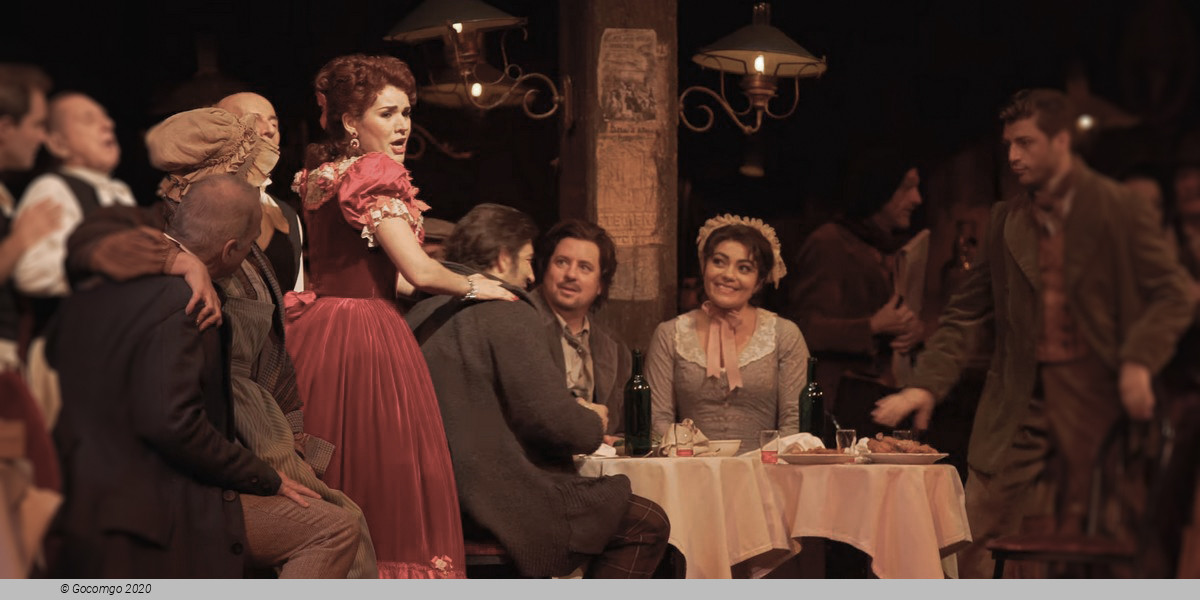
 Teatralnaya Square 1
Teatralnaya Square 1